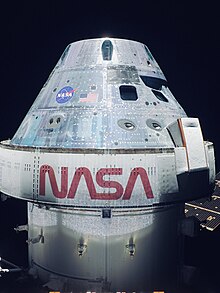Bruce Blackburn
Bruce Blackburn | |
|---|---|
| Born | June 2, 1938 Dallas, Indiana |
| Died | February 1, 2021 (aged 82) |
| Other names | Bruce N. Blackburn Bruce Nelson Blackburn |
| Occupation | Graphic designer |
| Notable work | NASA logo and the American Revolution Bicentennial |
Bruce Blackburn (June 2, 1938—February 1, 2021) was an American graphic designer, who was a designer of the National Aeronautics and Space Administration (NASA) logo and the American Revolution Bicentennial star.[1]
Personal and military life[edit]
Bruce Nelson Blackburn was born in Dallas on June 2, 1938, to Ruby (Caraway), a real estate agent, and Buford Blackburn, an electrical engineer. The couple also had a daughter, Sandra. Blackburn grew up in Evansville, Indiana during which he pursued his interests in music and art.[1] In 1961, he graduate with a Bachelor of Science degree in design from the University of Cincinnati.[1] He served as a communications officer in the Navy. In 1979, he married Tina Harsham and they had a daughter and two sons.[1]
Bruce Blackburn lived during his later years in Santa Fe, New Mexico and Lakewood, Colorado. He died on February 1, 2021, in Arvada, Colorado.[1]
Graphic designer[edit]


Blackburn worked for Chermayeff & Geismar, a design firm in New York, by the late 1960s.[1] In 1974, Blackburn was a designer, with his partner Richard Danne, of the 1976 NASA logo, also known as the "worm" for the shape of the red letters that make up the logo[1][2] for astronaut's uniforms.[3] Their design firm, Danne & Blackburn, was located in the state of New York.[1] The worm logo has been used as a logo for NASA and the Orion spacecraft.[4]

He also created the symbol for the American Revolution Bicentennial celebration,[1] using two stars (blue and red) to represent the multiple centuries with curved points for a less militaristic image than an outline of sharp points.[3] It was used on a 1971 special issue postage stamp, as well as letterhead, tax returns, products,[5] flags, and trains.[6] In 1978, he was a seminar professor at the school of design at the University of Cincinnati.[6]
Blackburn created logos for the Museum of Modern Art, Mobil, IBM,[1] Champion Paper, RCA, and other organizations,[6] like the Department of Transportation, and Army Corps of Engineers.[1]
He established his own design firm, Blackburn & Associates in New York City in the 1980s. In the mid-1980s, he was president of the American Institute of Graphic Arts. He was awarded the Presidential Design Award by Ronald Reagan in 1984.[1] In 2016, a short documentary Blackburn told of his work on the logo and his career that spanned over 40 years.[1]
References[edit]
- ^ a b c d e f g h i j k l m Vadukul, Alex of New York Times (February 20, 2021). "Bruce Blackburn, design of NASA logo, bicentennial star". The Buffalo News. p. 15. Retrieved February 28, 2024.
- ^ Beach, Charlotte (November 15, 2023). "NASA Celebrates the Worm Logo Designer, Richard Danne". Print magazine.
- ^ a b "Artist Bruce Blackburn, 37, Airs Bicentennial Symbol". The Marion Star. August 12, 1975. p. 2. Retrieved February 28, 2024.
- ^ Chang, Kenneth of The New York Times (December 14, 2023). "How a Space Agency Learned to Love 4 Squirmy Letters". Citizens' Voice. p. B7. Retrieved February 28, 2024.
- ^ Robinson, Angela (August 13, 1975). "The 'Fat Star' -- From Tax Forms to Beer Mugs". Newsday (Suffolk Edition). p. 11.
- ^ a b c Lang, Tony (May 21, 1978). "Good Design Spreading After All". The Cincinnati Enquirer. p. 138. Retrieved February 28, 2024.
